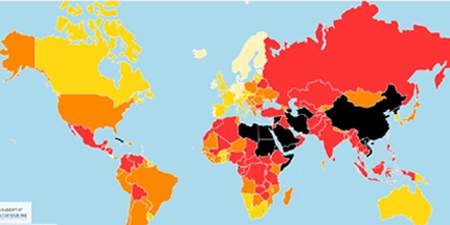Environment for reporters in Pakistan extremely unsafe: RSF
JournalismPakistan.com | Published: 18 April 2019
Join our WhatsApp channel
Pakistan has fallen to 142nd place in the 2019 World Press Freedom Index, indicating a dangerous environment for reporters. Journalists face harassment and violence, particularly in regions like Balochistan and Khyber Pakhtunkhwa.Summary
The Reporters Without Borders on Thursday released its 2019 World Press Freedom Index that shows Pakistan dropping three places from 139 to 142 this year.
The index says that the environment for reporters in Pakistan is extremely unsafe, and the Pakistani media is under the military establishment’s thumb.
The index points out that harassment of the media was significantly stepped up in the run-up to the July 2018 general elections. “There were many cases of brazen censorship. Distribution of newspapers, especially the leading daily Dawn, was interrupted.
“Media outlets were threatened with the withdrawal of advertising. The Geo TV network’s broadcast signals were jammed. Even cruder methods were deployed as the election drew closer. Intimidation, physical violence, and arrests were used against journalists who crossed the red line.”
The index adds the new government headed by Prime Minister Imran Khan announced the creation of a Pakistan Media Regulatory Authority (PMRA) – in which “regulation” is clearly intended to mean “censorship.”
Journalists meanwhile continue to be at risk in the field, especially in the western provinces of Balochistan and Khyber Pakhtunkhwa, where reporters are caught in the crossfire between the security forces and armed rebels. At least three journalists were killed in connection with their work in 2018. Two of them had been covering drug trafficking, RSF said.
The index shows how hatred of journalists has degenerated into violence, contributing to an increase in fear. It also shows that the number of countries regarded as safe continues to decline, while authoritarian regimes continue to tighten their grip on the media.
The United States this year dropped three places to 48th out of 180 countries, moving into the ranks of problematic countries. The United States became one of the five deadliest countries in the world for journalists after the fatal shooting of five employees at the Capital Gazette newspaper in Annapolis, Maryland.
The RSF said that with totalitarian propaganda, censorship, intimidation, physical violence and cyber-harassment, a lot of courage is needed nowadays to work independently as a journalist in the Asia-Pacific countries, where democracies are struggling to resist various forms of disinformation.
Two significant rises in the Index – both of 22 places – highlighted the degree to which a country’s political ecosystem impacts the freedom to inform. In Malaysia, the ruling coalition was ousted in an election for the first time in the country’s 62 years of independence. This blew fresh air through the ossified media and transformed the environment for journalists, propelling Malaysia to 123rd place.
In Maldives, the election of a new president who had given firm – and partially kept – promises to improve press freedom enabled this Indian Ocean archipelago to jump to 98th place.
The security situation is even more worrying in Afghanistan (121st, -3), where – despite the government’s efforts – 16 media professionals were killed in connection with their reporting, nine of them in a double bombing that explicitly targeted the press.
Much courage is now needed to be a field reporter in Afghanistan. Although less dramatic, the situation was also worrying in Bangladesh (150th), where reporters covering protests and the election were the targets of unprecedented violence.
Physical violence against journalists is encouraged by the fact that the perpetrators usually enjoy complete impunity, as is still the case, for example, in Sri Lanka (126th). In India (140th, -2), at least six journalists were also killed while trying to work in 2018. This tragic toll was accompanied by an increase in violence coming from all quarters, including the security forces, organized crime, and political activists. – Reporters Without Borders
KEY POINTS:
- Pakistan dropped three places in the World Press Freedom Index to 142.
- Journalists experience increased harassment and intimidation, especially before elections.
- Media censorship has escalated, with threats and violence against reporters.
- At least three journalists were killed in 2018 related to their work.
- The environment for reporters remains perilous across various regions, including Afghanistan.

























